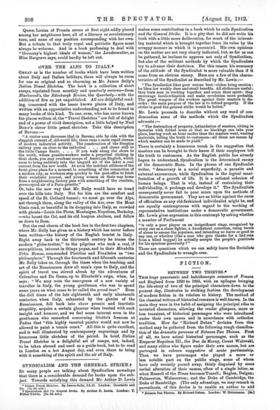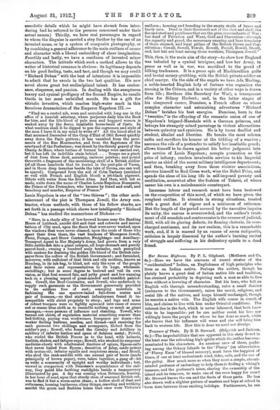FICTION.
BETWEEN TWO THIEVES .*
Tars huge panoramic and kaleidoscopic romance of France and England from 1820 to 1855, with an epilogue bringing the life-story of two of the principal characters down to the present day, illustrates in striking fashion the development of modern fiction in its relation to history. The method of the classical writers of historical romance is well known. In the main they were in the habit of assigning the principal roles to invented characters, allowing the reader glimpses, more or less transient, of historical personages who were introduced under their own names and in accordance with orthodox tradition. How far "Richard Dehan" deviates from this method may be gathered from the following rough classifica- tion of the dramatis personae of Between Two Thieves. First of all, we have actual historical personages, such as the Emperor Napoleon III., the Duo de Morny, Count Walewski, and many others who figure under their own names, but are portrayed in colours suggestive of acute partisanship. Then we have personages who played a more or less notable part on the public stage, some of whom have only recently passed away, thinly disguised by some verbal alteration of their names, often of a single letter, as when Russell of the Times becomes Tussell ; Raglan, Dalgan; Palmerston, Wahnerston ; and the Duke of Cambridge, the Duke of Bambridge. (The only advantage, we may remark in parenthesis, of this device is to enable an author to add
• Between Two Thieves. By Richard Dehan. London: W. Heinemann. Vs.]
anecdotic details which be might have shrunk from intro- ducing had he referred to the persons concerned under their actual names.) Thirdly, we have real personages in regard to whom the disguise is carried a step further by the use of an invented name, or by a system. of composite photography, or by combining a general adherence to the main outlines of career and character with a liberal embroidery of sheer imagination. Fourthly and lastly, we have a residuum of invented minor characters. The latitude which such a method allows to the writer of historical romance is obvious: its legitimacy depends on his good feeling, taste, and tact, and though we may credit " Richard Dehan" with the best of intentions it is impossible to admit that he excels in the two last qualities. His new novel shows great but undisciplined talent. It has exuber- ance, eloquence, and passion. In dealing with the sumptuous luxury and cynical profligacy of the Second Empire, he recalls Ouida in her most unbridled moods. He has a gift for vitriolic invective, which reaches high-water mark in this
ferocious denunciation of the Emperor Napoleon III. :—
"Find me a rusted nib, worn and corroded with- long use in the office of a knavish attorney, where perjurers daily kiss the Book for hire, and the life-blood of pale men and haggard women is sucked away by the fierce, insatiable horse-leech of Costs. In what medium shall it be dipped to pen the cognomen and style of the man I have it in my mind to write of ? All the blood shed in that accursed December of the Coup d'Etat of 1851 flowed quickly away down the Paris gutters ; it has vanished from the pave- ments of the Rue Montmartre, and from the flagstones of the courtyard of the Prefecture ; was drunk by the thirsty gravel of the Champ de Mars, where battues of human beings were carried out, but it has left its indelible stain behind. . . . Scrape me a pinch of dust from those dark, accusing, ominous patches ; and pound therewith a fragment of the mouldering skull of a British soldier (of all those hundreds that lie buried in the pest-pits of Yarns, and in those deep trenches beside the lake of Devna, one can well be spared). Compound from the soil of Crim Tartary (enriched so well with French and English blood) a jet-black pigment. Dilute with water from the River Alma. And then, with ink so made, write down the name of Charles Louis-Napoleon Bonaparte, the Prince of the Pretenders, who became by fraud and craft, and treachery and murder, Emperor of France."
Louis Napoleon is one of the " two thieves " ; the other arch- miscreant of the plot is Thompson Jowell, the Army con- tractor, whose methods, with those of his fellow sharks, are set forth in a passage which shows how intelligently "Richard Dehan" has studied the mannerisms of Dickens :— " Here, in a shady alley of low-browed houses near the Banking House of Lubbock, amidst dirt and dust and cobwebs and incrus- tations of City mud, upon the floors that were never washed, upon the windows that were never cleaned, upon the souls of those who spent their lives there, the vast business of Thompson Jewell, Flour, Forage, and Straw Contractor, Freightage- and Aniriliary- Transport Agent to Her Majesty's A;my, had grown from a very little cuttle-fish into a giant octopus, all huge stomach and greedy parrot-beak ; owning a hundred scaly tentacles, each panoplied with suckers for draining the golden life-blood of the British rate- payer from the coffers of the British Government ; and furnished, moreover, with sufficient of that thick and oily medium, known as Humbug, in its ink-bag, to blind, not only the eyes of the people and their rulers and representatives to its huge, wholesale swindlings • but in some degree to becloud and veil its own vision, so that font seemed fair, and petty greed and low cunning took on a pleasing aspect of great-minded and unselfish patriot- ism. Cowell, the Beef-Contractor, and Sowell, who undertook to supply such garments as the Government generously provided to its soldiers free of cost ; scamping materials in fashioning the one sparrow-tailed full-dress mates and pair of trousers,—so that stalwart infantrymen found it in- compatible with strict propriety to stoop; and legs and arms of robust troopers were so tightly squeezed into cases of coarse red or coarse blue cloth as to resemble nothing so much as giant sausages,—were persons of influence and standing. Towell, who turned out shirts, of regulation material something coarser than bed-ticking, paying wan workwomen fourpence per dozen—the worker finding buttons, needles, and thread—and receiving for each garment two shillings and sevenpenc,e, filched from the soldier's pay • Rowell, who found the Cavalry and Artillery in saddlery of inferior leather and spurs of dubious metal ; Powell, who roofed the British Forces as to the head, with helmets, busbies, shakos, and fatigue-caps ; Bowen, who stocked its surgeons' medicine-chests with adulterated tincture of opium, Epsom-salts that never hailed from Epsom; decoction of jalap, made potent with croton-oil ; inferior squills and suspicions sienna; and Shoell, who shod the rank-and-file with one annual pair of boots (made principally of brown paper), were, taken together, a gang of—let us write a community of upright and worthy individuals ; but, viewed in comparison with Dunoisse's acquaintance of the rail- way, they paled like farthing rushlights beside a transparency illuminated by gas. A day was coming when Britannia, leaning, in her hour of need, upon that sturdy stem of seasoned British oak, was to find it but a worm-eaten sham ; a hollow shell of dust and rottenness, housing loathsome, slimy things, crawling and writhing amidst the green and fleshless bones that once wore Victoria'a uniform ; housing and breeding in the empty skulls of brave and hardy men. Dead in their thousands not of the shot and shell, the fire and steel and pestilence that are the grim concomitants of War : but dead of Privation and Want, Cold and Starvation—through the rapacity and greed, the mercenary cunning and base treachery of those staunch and loyal pillars of the British Crown and Con- stitution : Cowell, Sowell, Towell, Rowell, Powell, Dowell, Shoell, and, last but not least among those worthies, Thompson Jewell."
This, then, is the main aim of the story—to show bow England was befooled by a cynical intriguer, and how her Army, in
peace as well as in war, was sacrificed to the greed cf bilking tradesmen. It is a prose epic of Machiavellian guile and brutal money-grubbing, with the British private soldier as chief martyr. On the side of the angels we have Ada Melling, a noble-hearted English lady of fortune who organizes the nursing in the Crimea, and in a variety of other ways is drawn from life ; Berthara (the Secretary for War), a transparent
alias for Sidney Herbert ; and, in the latter stages of his chequered career, Dunoisse, a French officer on whose
complex character and astonishing adventures " Richard Dehan" lavishes his best energies. Dunoisse, born in the " twenties," is the offspring of the romantic union of one of Napoleon's brigand-Marshals with a German princess, and betrays his strangely mixed parentage in violent alternations between quixotry and cynicism. He is by turns duellist and student, idealist and libertine. He breaks the most solemn oaths and sacrifices his honour at the bidding of a wan ton ; assumes the rule of a pretender to satisfy her insatiable greed; allows himself to be drawn against his better judgment into the service of Louis Napoleon ; accepts promotion as the price of infamy; renders invaluable services to his Imperial master as chief of the secret military intelligence department ; and then, breaking away from these sinister associations, devotes himself to Red Cross work, wins the Nobel Prize, and spends the close of his long life in self-imposed poverty and meditation, somewhat after the fashion of Tolstoi, of whose career his own is a melodramatic counterpart.
Immense labour and research must have been bestowed on the composition of this novel, of which we have given the roughest outline. It abounds in strong situations, treated with a great deal of vigour and a minimum of reticence.
But the length of the period covered by the narrative impairs its unity, the canvas is overcrowded, and the author's treat- ment of old scandals and controversies is the reverse of judicial.
Still, with all its glaring defects, its flaming rhetoric, its over- charged sentiment, and its raw realism, this is a remarkable
work, and, if it is marred by an excess of saeva inclignatio, criticism is largely disarmed by the author's burning recital
of struggle and suffering in his dedicatory epistle to a dead friend.



































 Previous page
Previous page